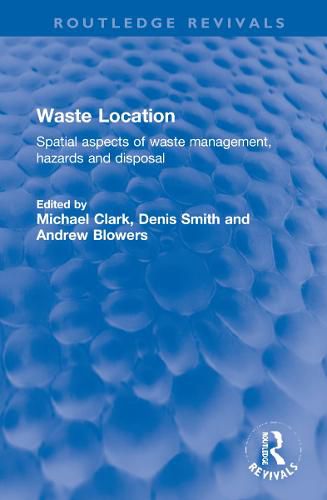Readings Newsletter
Become a Readings Member to make your shopping experience even easier.
Sign in or sign up for free!
You’re not far away from qualifying for FREE standard shipping within Australia
You’ve qualified for FREE standard shipping within Australia
The cart is loading…






First published in 1992, Waste Location seeks to widen and integrate the debate on the intrinsically spatial nature of waste disposal. The political and industrial significance of the new environmentalism of the 1980s came from the recognition of growing public pressure for environmental quality and product reliability. Attention was turned to waste as the product of consumption. As the political economy of waste was explored, new issues were raised: new technologies, recycling, pollution havens, waste minimization, location of landfill sites and incinerator facilities, and environmental crime, responsibility and planning. The 1990s sees the advocates of ‘cradle to grave’ responsibility still battling the promoters of market forces.
One of the major developments in the study of waste collection and disposal was the new forms of data collection and handling technology. The contributors consider both geotechnics and geographical information systems within this context. The focus on the geography of the UK is set within the broader framework of political economy and the international trade in pollution exports. The case studies presented range from bin analysis through a Bayesian perspective on risk to the global politics of international waste streams. Together, the contributors provide a comprehensive overview of the waste location debate in the early 1990s. Students of environment and climate change will find this book particularly enlightening.
$9.00 standard shipping within Australia
FREE standard shipping within Australia for orders over $100.00
Express & International shipping calculated at checkout
First published in 1992, Waste Location seeks to widen and integrate the debate on the intrinsically spatial nature of waste disposal. The political and industrial significance of the new environmentalism of the 1980s came from the recognition of growing public pressure for environmental quality and product reliability. Attention was turned to waste as the product of consumption. As the political economy of waste was explored, new issues were raised: new technologies, recycling, pollution havens, waste minimization, location of landfill sites and incinerator facilities, and environmental crime, responsibility and planning. The 1990s sees the advocates of ‘cradle to grave’ responsibility still battling the promoters of market forces.
One of the major developments in the study of waste collection and disposal was the new forms of data collection and handling technology. The contributors consider both geotechnics and geographical information systems within this context. The focus on the geography of the UK is set within the broader framework of political economy and the international trade in pollution exports. The case studies presented range from bin analysis through a Bayesian perspective on risk to the global politics of international waste streams. Together, the contributors provide a comprehensive overview of the waste location debate in the early 1990s. Students of environment and climate change will find this book particularly enlightening.